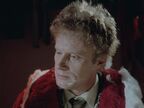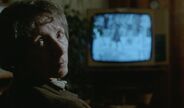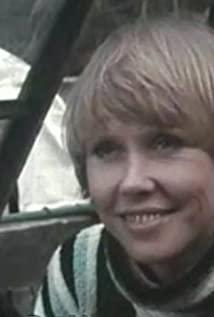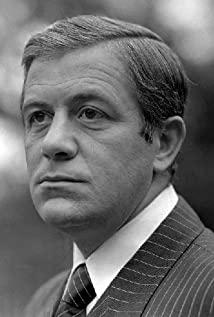The fifth story is one of the "Ten Commandments" series whose narrative structure relies more on technique. The important characters involved in the play appear one by one in a parallel narrative, and then connect at a certain moment, although this seems to be today's It is already one of the common ways of telling, but it still seems very appropriate in this story. The seemingly carefully laid out relationship between characters actually shows the contingency of individual destiny more extreme.
Jacques is a silent and stern young man. As soon as he appeared on the stage, he began to wander on the street, seemingly aimlessly making contact with all kinds of people. His violent tendencies and the "evil" part of his character were in this process. Partially revealed in the young man he pushes to the bathroom and smiles at him, spit in a cup when leaving a coffee shop, throws a rock from an overpass to cause a car accident, etc. Such a character is secretly worried, but these actions themselves are more like a prank, if it is not known in advance that this is a murder-related film, when the scene where Jacques kills the taxi driver appears, it will definitely feel sudden and shocking.
The taxi driver was almost hit by a dirty rag as soon as he came on the scene, which is a hint of the character's fate, but also brought out his unflattering personality, this is a cynical middle-aged man who tries to peep at the teenage beetle At the bottom of Yata's skirt, the Dora couple who appeared in the second episode wanted to take his taxi. They stood in the strong wind and waited for him to wash the car, but after washing the car, he walked away. Although his behavior was disturbing. There is a little disgust, but it is definitely not to the point of using death to punish. The director has always insisted on using details to foreshadow his small malice, and then suddenly uses death to win sympathy. This kind of reversal of the character's emotions aims to express a All things are impermanent and absolute.
The connection between the taxi driver and Jacques, in addition to the relationship between killing and being killed, there is also the girl Beata. When Jacques drove the taxi he grabbed to find the girl he liked, this girl was Beata. Of course, The girl looked horrified, and she recognized the car. Here Jacques said something that they wanted to run away from home together. This may explain the motive of the murder, but it is far-fetched, so this connection point was deleted in the final film, making Jacques' murder more inconvenient. The certainty also brings the spearhead of the story closer to the commandment itself of "Thou shalt not kill (without cause)".
Compared with the previous episodes, the film and script of this episode have undergone major changes. The most obvious of which is that the film focuses more on young lawyer Peter. He is the first to appear in the film and uses narration to describe his understanding of the law. This is an idealistic young man. He hopes to correct the mistakes made by the big machine of the judiciary through his personal efforts. He successfully passed the judicial examination, and the first case he represented after that was the case of Jacques. The connection of personal destiny to the huge legal system is completed here.
In the beginning of Peter's exposition, he said that "punishment is a form of revenge, especially when it is already injuring the criminal rather than preventing it," so in the process he has been working to use a more humane In the end, Jacques was sentenced to death, and Peter was so brooding about it that he even went to the judge out of order to ask the judge, if it wasn't himself, but a more experienced old lawyer, Jacques Could the result be any better, the judge told him it couldn't have been better than him.
Whether the judge wanted to console the legal rookie or not, the end result was the same, Peter was overwhelmed by a feeling of helplessness, he went to visit Jacques, hoping to do something for him, and Jacques about Here, the story of his sister finally brought him a little sympathy from the audience, a lawyer and a criminal, two helpless people who are more and more isolated and helpless in the face of an invisible system.
"Law is a human concept that regulates relationships between individuals. We and our way of life today are the result of law and its operation, whether we obey or violate it." If you pay close attention, you will find that the appearances of several characters in the film are all by means of mapping. Peter appears in the mirror, the taxi driver appears in the glass on the door, and Jacques is reflected in the window of the theater. This contrasting relationship between man and mirror is a true portrayal of the relationship between man and system. Humans create all this to compare their behaviors, but in the end, they find that human beings are the fragile and fragile of the two. one side.
Jacques was finally hanged in an extremely realistic scene, and Kieslowski's expression ended here. Although there is an ambiguous ending of lawyer Peter shouting "hate" in the car, it cannot be taken for granted. Guess the direction of his criticism. After all, the opening sentence of the film says, "The law should not imitate nature but should improve it". The existence of the law is unquestionable. For people, obtaining the answer requires more people to participate and a longer process.
View more about Dekalog reviews











